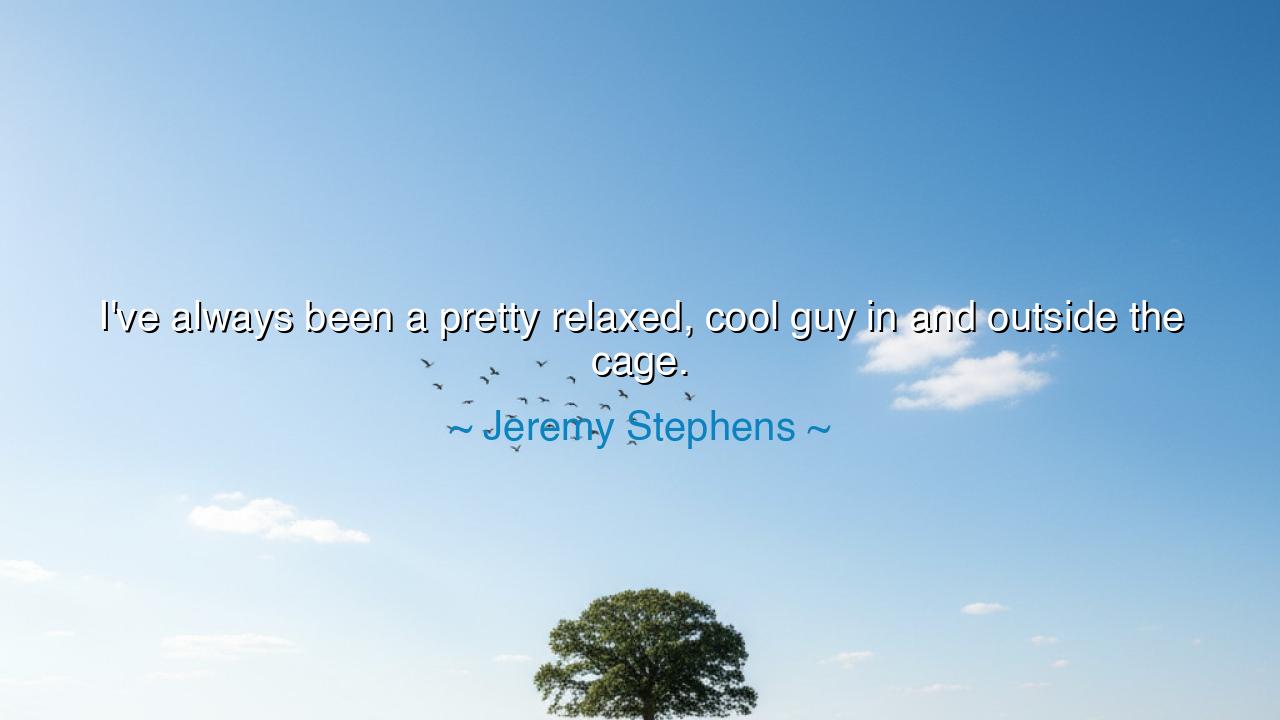
I've always been a pretty relaxed, cool guy in and outside the






In the heart of every great warrior, there lies a deep calm, a centeredness that allows them to face the most daunting challenges with clarity and grace. Jeremy Stephens, in his reflection, "I've always been a pretty relaxed, cool guy in and outside the cage," speaks to a profound truth that the greatest strength is not always in the outward show of force, but in the quiet, unwavering composure within. His words remind us that the external chaos of life—whether in the arena of competition or the turbulence of everyday struggles—can be met with an inner peace that allows us to navigate even the fiercest battles.
The ancients understood this balance between strength and calm. Homer, in his epic The Iliad, often described the greatest heroes not just by their feats of strength, but by their ability to remain composed in the heat of battle. Achilles, though a mighty warrior, was not merely defined by his anger or fury but by his ability to remain focused in moments of intense conflict. The Stoics, led by Epictetus and Marcus Aurelius, also understood that true strength lay in one’s ability to control their emotions and remain grounded in the face of hardship. To be relaxed—to maintain a calm demeanor—was a virtue they aspired to, for it allowed them to act with wisdom and clarity, no matter the storm surrounding them.
Consider the example of Alexander the Great, whose empire stretched across vast lands and who faced numerous battles and challenges. Despite his immense power, it was often his ability to remain composed in the most critical moments that defined his success. At the Battle of Gaugamela, when his forces were outnumbered and the odds were against him, Alexander’s calmness and strategic thinking turned the tide of the battle. He did not rage against the overwhelming forces; instead, he moved with purpose, executing a well-crafted plan. Alexander, like Stephens, knew that true strength is not just about overpowering your opponents but maintaining an inner peace that allows you to think and act without being consumed by fear or anger.
In the same way, the Zen masters of ancient Japan often spoke of the importance of stillness and calm in the face of adversity. The legendary samurai, though skilled in the art of combat, understood that it was their mental discipline, their ability to stay focused, that would determine the outcome of a fight. Their swordsmanship was not just about physical prowess but about the mindset they carried into battle. The same can be said for Stephens, whose ability to remain cool under pressure in the cage—just as in life—allowed him to perform with a level of skill and precision that many might overlook. It was not the fury he displayed, but the quiet confidence and self-mastery that made him formidable.
This calmness is not to be mistaken for passivity or lack of action. In fact, it is the opposite. True relaxation in the face of difficulty is the mastery of one’s mind and emotions. It is the ability to be fully present, to face adversity without being consumed by it. In ancient Chinese philosophy, the concept of Wu Wei, or “effortless action,” taught that the greatest achievements come not from force, but from flowing with the natural course of events. When a person is relaxed and centered, they can act with the efficiency and precision of a master, without wasting energy on unnecessary movements. It is through this balance that warriors, like Stephens, are able to face challenges with grace, overcoming them not with aggression but with strategy and self-control.
The lesson from Stephens and the ancient heroes is clear: the true measure of strength is not in how much we can force or how loudly we can proclaim our power, but in our ability to remain composed in the midst of chaos. Life, much like the battles of old, will bring moments of struggle and conflict, but it is through our calmness that we can act with the greatest clarity. Just as the great warriors of the past relied on their mental fortitude, we too must cultivate this inner strength. In moments of adversity, let us not be swept away by the storms of emotion, but let us remain grounded, focused, and guided by a steady hand.
To follow this path, we must learn to cultivate calmness in our own lives. Whether in our personal struggles or professional challenges, we should aim to embody the same relaxed confidence that Stephens describes. Let us focus not on the chaos around us, but on the strength that lies within. By doing so, we can face the challenges of our lives not with fear or rage, but with wisdom, clarity, and the quiet power of a mind that knows its own strength.






AAdministratorAdministrator
Welcome, honored guests. Please leave a comment, we will respond soon